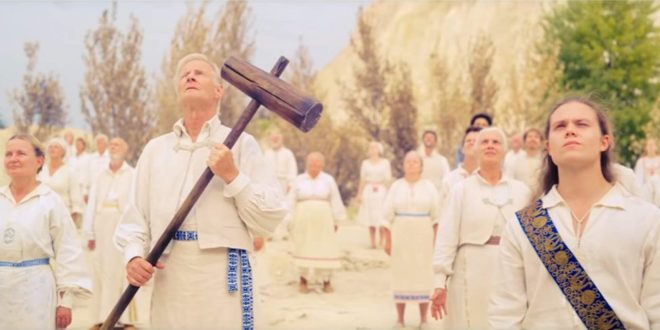There are few things that make one feel as helpless as grief. Losing a loved one isolates and warps a person until they are as a buoy at sea: adrift, bobbing, clanging a mournful song to a barren ocean of loss. One way to slow this agonizing tide is to turn to art that truly seems to echo back our haunted bells in the black. One artist who charts that ocean for us is Ari Aster, whose Hereditary provided a brutal portrait of a mother’s mourning, and a world bent and broken by it.
How fitting then that Aster should return with another crushing journey through grief in Midsommar, this time with a woman who lost her parents and sister to suicide. Rather than settle for an occult-colored rendering of the helplessness we all feel at the chaos of loss as he did in Hereditary, Aster provides us with a map through our grief. That map that leads, oddly enough, into Sweden and onto the blood-soaked, sun-bleached grass of a pagan commune.

The film begins with a jarring Swedish language invocation over painted wooden boards depicting angels, devils, magic, and bright colors. This visual language indicates, like the dollhouse in Hereditary that this art is contained, finite, and intentional. It is a spell, a fable, a lesson that, throughout Midsommar’s bloody and hallucinogenic run time, we will learn.
The spell is cast on Dani, (played ferociously by Florence Pugh), a young woman mired in familial anxiety. Her bipolar sister experiences violent mood swings and leaves threatening messages for Dani, her parents, and Dani’s boyfriend Christian (played by Jack Reynor) to decode and deal with. One such message opens the action of Midsommar with a voicemail from Dani left on her parents’ voicemail, warning them that the sister is at it again, but with a darker threat than usual. When Dani calls Christian, he calms her down, dismissing the threat as more of the same attention-seeking behavior.
After he is proven wrong, Dani is adrift in grief. She finally decided to shake herself loose of her pain by joining Christian and his friends on a trip to Sweden for the Midsommar festival. This kicks into motion a hellish sojourn of mushroom trips, death, betrayal, and mysticism.

The acting, it shouldn’t be lost in all the textual analyses of the film, is superb throughout. Florence Pugh journeys through her grief as a wild animal, a gaslit victim, a wanderer, and a force of nature. She stands neck and neck with Oscar winner Lupita Nyong’o’s turn in Us (2019) for best genre performance of the year, a feat I thought impossible leaving the theatre in March. Will Poulter’s heel turn obliterated any memory I had of his comedic innocence in We’re The Millers (2013). And William Jackson Harper’s performance as an intellectually insatiable grad student was perfect and excruciatingly accurate.
Midsommar is a rhapsodic exploration of our relationship to grief. The Swedish incantation that scores the film’s opening montage harmonizes with Dani’s guttural sobs at losing her sister. The film begins with an unanswered ringing phone and a robotic voice warning us about the impending suicide. When we do finally see the sister, her mouth duct taped around a hose pumping car exhaust, the firefighters and emergency personnel walk from room to room like spectres, deaf and blind to the nightmares around them. These feel like grim depictions of all the ways modern society disconnects us from pain, and leaves us numb and helpless when pain comes for us. It is also no accident that these scenes of Dani’s “real world” are the darkest in the film.
When we arrive in Sweden, accompanied by Christian, Dani, their irritating friend Mark (played by Poulter) and less-irritating friend Josh (played by Harper), and the Swedish friend who brought them here, Pelle (played by Vilhem Blomgren), we are taken out of time, literally and figuratively. The commune is out of step with the modern world, living in isolation and blissful antiquity. They sleep in a one-room dormitory, treat with homeopathic remedies, and nobody seems to have a cell phone. When we are confronted with the first violent set piece, the pagans of the commune accept it as a part of life. Death has a lasting effect on their community, but they experience, accept, and process it together. Grief has no purchase on a people that feel each loss in unison.
The film then becomes an exercise in cognitive dissonance for its audience. We are trained, through dialog and character development, to mistrust Christian and his friends, and each of the film’s explosively violent moments are punctuated by deep ritual and mysticism. Is this commune a murderous cult, or simply a misunderstood culture with its own doctrine for violence? Aster, as we learned in Hereditary or his radioactive viral short film The Strange Thing About the Johnsons, is not interested in simple answers.

The camera, our unreliable companion through this journey, employs quick cuts, close-ups, and hallucinatory special effects to place us firmly in Dani’s psyche. We ignore the logic that says she never saw her sister’s grim last moments. Instead, we experience its intrusion during mushroom trips as a metaphor for the shock of her loss. The setting’s perpetual daylight takes away our ability to process time, the way grief will make each minute into a lifetime of solitary pain.
The dollhouses and small, domestic sets in Hereditary were meant to convey a fatalistic inevitability to the film’s proceedings. The wide open spaces and ambiguous magic of Midsommar seem to suggest the opposite, that all grief is a flood of a hundred ways through, some may shock people, some may feel like home a thousand miles from normal life.
 PopHorror Let's Get Scared
PopHorror Let's Get Scared




